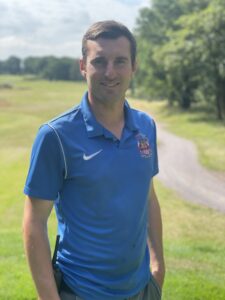Meet the course manager: Ben Goodchild
Related Articles
From Warrington Golf Club in Cheshire, a club that is positioned at the highest point in Warrington, course manager Ben Goodchild takes us through his average day.
What time do you arrive at the club and what is your morning routine?
I get there just before 6am. Everyone meets in the break room and the first thing we’ll do is go through the tee sheet for the day. Then we go through the schedule on TurfKeeper and discuss everyone’s jobs in more detail for the morning.
How many people are there in your team and do you share tasks?
There are seven staff here at Warrington. Alongside myself is a spray technician, irrigation technician, mechanic and three further assistant greenkeepers. We do share tasks, and work together on jobs like hand mowing the greens, tees and boxing off the fairways to get these tasks done ahead of golf.
How do you motivate your colleagues?
We are lucky here at Warrington that everyone is very self-motivated. We do have some afternoons off to do to team building exercises, and some of the team go and do tournament support at other clubs which means they come back with new ideas and fresh enthusiasm.
What aspects of your job give you the greatest satisfaction?
A lot of elements of greenkeeping give me satisfaction – from a perfectly presented bunker to sailing in the hand mown strips and big winter projects where you’re changing the course for an even better future. My biggest satisfaction probably comes from seeing a young greenkeeper develop their skills and becoming passionate about their job.
And the least satisfaction?
The least satisfying thing about the role can be hearing complaints about the course when you and the team are working so hard to strive for perfection.
Have you attended any courses recently, and if so, what did you take away?
At BTME this year, I did a one-day irrigation course learning about the importance of delivering the right amount of water across your course. We know that’s needed to achieve a great playing surface for the golfer, but it was interesting to see how new systems can deliver this in a more sustainable and precise way.
What’s your favourite season of the year and why?
My favourite season has to be spring; when you see the daffodils coming out, the definition on fairways and greens starts to come back and you begin to witness all of your hard work through the winter period paying off.
Are you witnessing evidence of climate change and, if so, how has your job had to adapt to changing weather patterns?
I think we are all feeling the effects of climate change, particularly how the summers are becoming more intense.
Here at Warrington we invested in a borehole which means we are more self-sufficient with our water supply, and it isn’t costing the club an excessive amount of money each year to maintain great playing surfaces.

Have you had to overcome any course issues with disease and / or pests?
Yes. Like every course we have struggled with disease in the past, but by integrating a good turf management programme and overseeding with browntop and creeping bent grass seed I am pleased to say we have seen less and less disease each year.
Do you have a feeding programme for your fairways? How do you ensure your greens have good colour?
This year, I have worked closely with ICL to make a feeding programme for the fairways, but even more importantly, constructed a wetting agent programme as we’re on sandstone here so we struggle to keep grass alive on the fairways during dry periods through the summer months. It’s a simple but effective monthly programme which seems to be doing a great job so far. To get the budget approved by the committee I used the TurfKeeper software to show the hours and money spent on greens and tees in comparison to the fairways.
On greens, we use a weekly spray programme to keep them in good health throughout the year, with a steady input of nitrogen to keep them in good colour.
With a growing focus on sustainability, do you deploy any sustainable practices in the management of your course?
We employ several sustainable practices here, from creating compost piles from our waste which we use for winter projects, to using wetting agents throughout the course to reduce our water consumption and investing in modern electric powered machinery to lower our fossil fuel emissions.
What do you do to support wildlife?
We have bird and bat boxes across the course and wildflower areas to help with biodiversity. We have also introduced fish and plants into the pond to help break down the algae, absorb nutrients and filter the water more naturally.
What are the technological developments that you feel have been the most important in your career to date?
Back in 2015, I went on the Ohio Program for 18 months which was really important in furthering my career as a greenkeeper. From this I gained the knowledge and confidence to push myself in the industry, learning the importance of timely fertiliser applications and water management at some of the world’s best golf courses. It is one of the greatest experiences I have ever had.
Do you use social media professionally and what do you think this contributes to the industry?
I don’t use social media a lot, but it is one thing I would like to do more of. I think social media can give everyone new and inventive ideas, helping greenkeepers to tackle challenges by thinking outside of the box.
How would you improve the greenkeeping industry?
I would like to go into schools and encourage children to consider a career in greenkeeping, show them the fantastic colleges and highlight the opportunities there are within our industry. You can make a career anywhere in the world working with turf!
What advice would you give to a young greenkeeper starting out today?
Remember that greenkeeping is a rewarding profession but it requires dedication, continuous learning and a genuine love for the craft. Best of luck on your journey!
How do you spend your leisure time?
I spend my time outside of work with my amazing family, girlfriend Laura and two-year-old boy Lucas. When I’m not with them, I’m normally on the course playing golf.

























